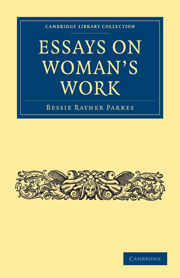V - OTHER PROFESSIONS
Published online by Cambridge University Press: 05 July 2011
Summary
WHEN moral and material causes combine to effect changes in the same direction, it is not always easy to divide the responsibility between them. The great extent of female destitution is chiefly due to economical changes and shortcomings, and can only be dealt with by economical reforms; but the great increase of female activity in this generation is chiefly due to other circumstances. Women would neither starve, nor, except in very limited numbers, become teachers if they could help it; but they would in numerous cases silently follow other and more intellectual avocations, and are constantly found to do so with great delight and profit where no pecuniary need exists. To make any practical distinction between the two orders of working women would be impossible; they run into each, and are confounded at every turn in the higher walks of industry. Many a woman who was forced to work has found that genius developed under the happy necessity; and such are no subjects of pity, but should rather bless the privation of worldly riches which set them free.
Not only have we a large number of single women working successfully in literary and artistic pursuits, but very many married women also, who, so far from neglecting their families, have helped to provide for them, or if widowed, have wholly provided for them by their exertions; and they have been enabled to do this partly because the scientific improvements of the time have allowed the physical necessities of domestic life to be supplied with far less personal trouble than formerly.
- Type
- Chapter
- Information
- Essays on Woman's Work , pp. 111 - 136Publisher: Cambridge University PressPrint publication year: 2010First published in: 1865

